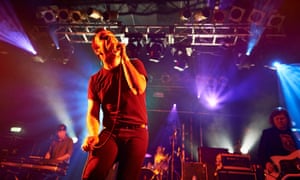This is our last show for four or five – maybe even six or seven – months,” says Samuel T Herring to a sold-out crowd at the Triffid inBrisbane.
For most bands, this would hardly be noteworthy. For Future Islands, it will mark their longest continuous break from live shows since they first got together in 2006.
“It’s not like we’re sad. I think we’ve been ready for a while,” says Herring backstage, neither bothered nor impatient. Future Islands don’t complain. They don’t look tired. This is part of the job, and they love what they do.
“The line has been drawn a couple of times before,” says bassist William Cashion of the trio’s ever-expanding world tour. “Then we’ve had to erase it and redraw it.”
“There were times when our label thought we were crazy,” adds Cashion. “For a while we lived like this because we had to. Now we do it because we love it.”
They’ve known tonight was the end for a while. This tour, in support of their fourth album, Singles, is a “258-headed beast” that began almost two years ago.
The band opened that first show at Eagle Rock Centre for the Arts in Los Angeles as they do tonight, with Back in the Tall Grass, an upbeat number that shows off Herring’s range of both vocals and dance moves: from his lower, guttural voice to higher, strained yelp, plus his jumping, darting, weaving and crouching.
He beats his chest, often with a pained expression that suggests he might start speaking in tongues. Or rolls his body with a pout. Before too long, the paisley shirt he is wearing is several shades darker from hard-earned sweat.
The second song at the Eagle Rock gig was the then-unknown Seasons. Exactly one month later, Future Islands would perform it on Late Night with David Letterman, drawing an enthusiastic response from the famously disinterested host and almost 680,000 views online.

Among those whose minds were newly blown was the Guardian’s Tim Jonze. It wasn’t a fluke (Future Islands had honed their skills over 800 live shows by then) but it catalysed a swift rise in popularity.
“When you tour a city every four or five months you build consciousness. You see it growing and you really believe in what you’re doing,” Herring tells me. By that measure, the trio must certainly be satisfied.
When they next played Los Angeles, six months after that first show to just over 200 people, it was at the 1,200-capacity Fonda theatre. Three months later still, it was at the 1,800-capacity Wiltern. And so it went around the world: repeat visits, each time expanding into larger venues in larger cities and new venues in smaller ones.
The trio’s last show in LA show was in support of Grace Jones at the 17,000-seat Hollywood Bowl. It was also meant to be the last of the tour until they were invited to support Mumford and Sons in Australia.
Seasons appears towards the end of their main Brisbane set. As expected it draws a prolonged, passionate response from the crowd, like the one that brings the band back on stage for an encore – although it’s not like they need much coaxing. Each song is introduced as their “last” before they launch into another. They display the playful humour of a band who’ve earned every right to rush backstage for celebratory drinks (or “pizza party” as they describe it), but who stay on stage, putting off the end and pushing through the strain.
The encore’s second song is Beach Foam, one of their oldest and best songs, but also one of the most taxing on Herring’s voice. It’s his most noticeable vocal falter of the night – indeed, of each of the five shows I’ve witnessed across 15 months of the tour. But if there are signs of wear and tear, it’s only compared to their usual high watermark.
“Let’s dance one last time,” Herring shouts as he begins jumping. This, too, is a fake-out. He laughs, before moving into Little Dreamer, whose slow, moving tone provides suitable closure to the energy of the tour.
As the song finishes Cashion holds his bass aloft, the closest to the rock star antics of their frontman, while synth player Gerrit Welmers sneaks off with low-key casualness.
“This is for that person you keep coming back to,” Herring had said earlier, as the crowed roared over the opening notes of Seasons. “It’s OK to move on.”
Future Islands keep coming back to the road, and they aren’t bruised from doing so. It’s clear tonight marks just another temporary departure. And the road will keep waiting on them; it will always take them back.
[“source-theguardian”]<IMG SRC="https://pixel.adsafeprotected.com/rfw/st/47607/6601244/skeleton.gif" BORDER=0 WIDTH=1 HEIGHT=1 ALT="">




